Ancient Ayurvedic sleep teas blend powerful herbs to promote restful slumber and balance your body's doshas. You'll find chamomile, a calming floral that reduces stress and anxiety, alongside ashwagandha, an adaptogen that lowers cortisol levels. Valerian root acts as nature's sedative, while passionflower relieves anxiety and racing thoughts. Holy basil regulates blood sugar and boosts immunity, and a pinch of nutmeg adds warming, sedative effects. To brew, use one teaspoon of dried herbs per 8 ounces of water, steeping for 5-10 minutes. Incorporate this tea into your nightly routine for ideal benefits. Discover how these essential ingredients can transform your sleep quality.
Understanding Ayurvedic Sleep Principles
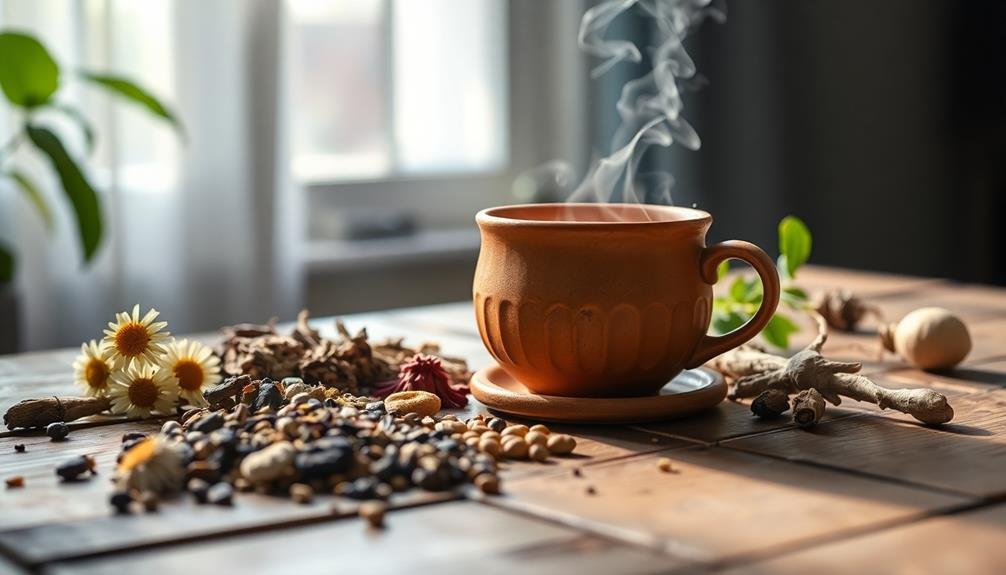
Balance lies at the heart of Ayurvedic sleep principles. According to this ancient Indian system of medicine, your sleep quality is directly influenced by the harmony between your body's doshas: Vata, Pitta, and Kapha. When these energies are in equilibrium, you'll naturally fall into restful slumber.
Ayurveda emphasizes the importance of establishing a consistent sleep routine. You're encouraged to align your sleep-wake cycle with nature's rhythms, going to bed and rising at the same times daily. This practice helps regulate your body's internal clock, promoting better sleep quality.
Your evening routine plays a vital role in preparing for sleep. Ayurveda recommends winding down with calming activities like meditation, gentle yoga, or reading. You should avoid stimulating activities and electronic devices before bedtime.
Nutrition also impacts your sleep. Ayurvedic principles suggest eating your last meal at least three hours before bedtime and opting for light, easily digestible foods in the evening.
Certain herbs and spices are believed to promote relaxation and improve sleep quality, which is why Ayurvedic sleep teas are popular remedies for insomnia and restlessness.
Chamomile: Calming Floral Powerhouse
Chamomile has been a trusted herbal sleep aid for thousands of years, with roots in ancient Egyptian, Roman, and Greek cultures.
You'll find this gentle flower packed with flavonoids, compounds that help reduce stress and promote relaxation.
Ancient Herbal Sleep Aid
For centuries, chamomile has reigned as a calming floral powerhouse in the domain of herbal sleep aids. This ancient herb, revered in traditional medicine systems worldwide, continues to be a go-to solution for those seeking natural sleep remedies. You'll find chamomile in various forms, but it's most commonly consumed as a soothing tea.
Chamomile's sleep-inducing properties stem from its rich content of apigenin, a flavonoid that binds to specific receptors in your brain. This interaction promotes relaxation and reduces anxiety, paving the way for a restful night's sleep.
When you sip on chamomile tea before bedtime, you're not just enjoying a warm beverage; you're partaking in a time-tested ritual that can greatly improve your sleep quality.
Research has shown that regular consumption of chamomile tea can help reduce the time it takes to fall asleep, decrease nighttime awakenings, and enhance overall sleep efficiency.
It's particularly beneficial for those suffering from mild to moderate insomnia or sleep disturbances. By incorporating this gentle yet effective herbal remedy into your nightly routine, you're tapping into an ancient wisdom that promotes natural, restorative sleep.
Flavonoid-Rich Stress Reducer
A key player in the world of natural sleep aids, chamomile's reputation as a flavonoid-rich stress reducer is well-deserved. This gentle herb packs a powerful punch when it comes to promoting relaxation and easing you into a restful slumber.
You'll find that chamomile's calming effects stem from its high concentration of flavonoids, particularly apigenin. When you brew a cup of chamomile tea, you're revealing a treasure trove of these beneficial compounds. Apigenin works by binding to specific receptors in your brain, potentially reducing anxiety and initiating sleep.
It's not just about falling asleep, though; chamomile can also improve your sleep quality. You'll appreciate chamomile's versatility, too. It's not only effective as a tea but also available in capsules, tinctures, and even topical applications.
For the best results, steep your chamomile tea for about 5-10 minutes to extract its full potential. Remember, while chamomile is generally safe, it's always wise to consult with your healthcare provider, especially if you're pregnant, nursing, or taking medications.
Embrace this floral powerhouse as part of your nightly routine, and you may find yourself drifting off to sleep more easily.
Ashwagandha: Stress-Reducing Adaptogen
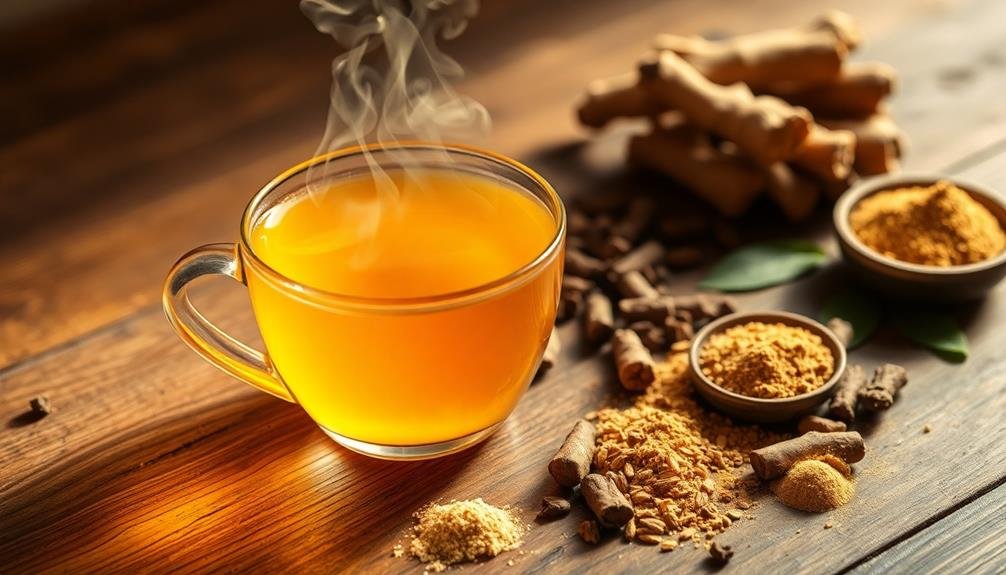
Ashwagandha, a powerful adaptogenic herb, can greatly lower your cortisol levels, helping you fall asleep more easily.
You'll find that this ancient Ayurvedic remedy reduces anxiety and stress, promoting a calmer state of mind before bedtime.
Cortisol-Lowering Sleep Aid
One of the most potent natural sleep aids in Ayurvedic medicine is ashwagandha, an adaptogenic herb renowned for its stress-reducing properties.
It's particularly effective in lowering cortisol levels, the hormone responsible for your body's stress response. By regulating cortisol, ashwagandha helps calm your mind and prepare your body for restful sleep.
When you consume ashwagandha as part of your sleep tea, you're tapping into its ability to combat insomnia and improve sleep quality.
It works by enhancing GABA activity in your brain, promoting relaxation and reducing anxiety. This herb also supports the production of melatonin, your body's natural sleep hormone.
Regular consumption of ashwagandha can lead to long-term benefits for your sleep patterns.
You'll likely experience reduced sleep onset latency, meaning you'll fall asleep faster. It may also increase your total sleep time and improve overall sleep efficiency.
As an added bonus, ashwagandha's adaptogenic properties help your body better manage stress during the day, which can indirectly contribute to better sleep at night.
Anxiety Reduction Properties
Beyond its sleep-inducing effects, ashwagandha's anxiety-reducing properties make it a powerful ally in your quest for better rest. This adaptogenic herb has been used for centuries in Ayurvedic medicine to combat stress and promote relaxation.
When you're anxious, your mind races, and sleep becomes elusive. Ashwagandha helps by regulating your body's stress response, allowing you to unwind and prepare for a restful night.
Studies have shown that ashwagandha can greatly reduce anxiety levels and improve overall well-being. It works by:
- Lowering cortisol levels, the primary stress hormone
- Enhancing GABA receptors, promoting calmness
- Modulating neurotransmitters associated with mood and relaxation
Improved Sleep Quality
The stress-reducing benefits of ashwagandha directly contribute to improved sleep quality. This powerful adaptogen helps regulate your body's stress response, allowing you to relax more easily when it's time for bed. By lowering cortisol levels, ashwagandha can help you fall asleep faster and experience deeper, more restorative sleep cycles.
You'll find that ashwagandha's sleep-enhancing effects are cumulative. As you continue to consume it regularly, you're likely to notice a gradual improvement in your overall sleep patterns. It can help reduce the frequency of nighttime awakenings and increase the duration of your deep sleep phases.
Ashwagandha's impact on sleep quality isn't just about quantity; it's about the quality of your rest. You may experience more vivid dreams and wake up feeling more refreshed and energized. This herb can also help regulate your circadian rhythm, making it easier to maintain a consistent sleep schedule.
For ideal results, try incorporating ashwagandha into your nightly routine. You can steep it in hot water as part of your sleep tea blend or take it in supplement form before bed.
Valerian Root: Nature's Sedative
Valerian root stands as a cornerstone ingredient in many Ayurvedic sleep teas, earning its reputation as nature's sedative. This herb has been used for centuries to promote relaxation and improve sleep quality.
When you consume valerian root tea, you're tapping into a natural remedy that's been scientifically proven to reduce the time it takes to fall asleep and enhance overall sleep duration.
The power of valerian root lies in its ability to increase levels of gamma-aminobutyric acid (GABA) in your brain. This neurotransmitter helps calm your nervous system, making it easier for you to unwind and drift off to sleep.
Unlike synthetic sleep aids, valerian root doesn't typically cause morning grogginess or dependency.
To make the most of valerian root in your Ayurvedic sleep tea:
- Steep for 10-15 minutes to guarantee full extraction of its beneficial compounds
- Combine with other calming herbs like chamomile or passionflower for synergistic effects
- Drink 30-60 minutes before bedtime to allow time for absorption
Passionflower: Anxiety-Alleviating Herb
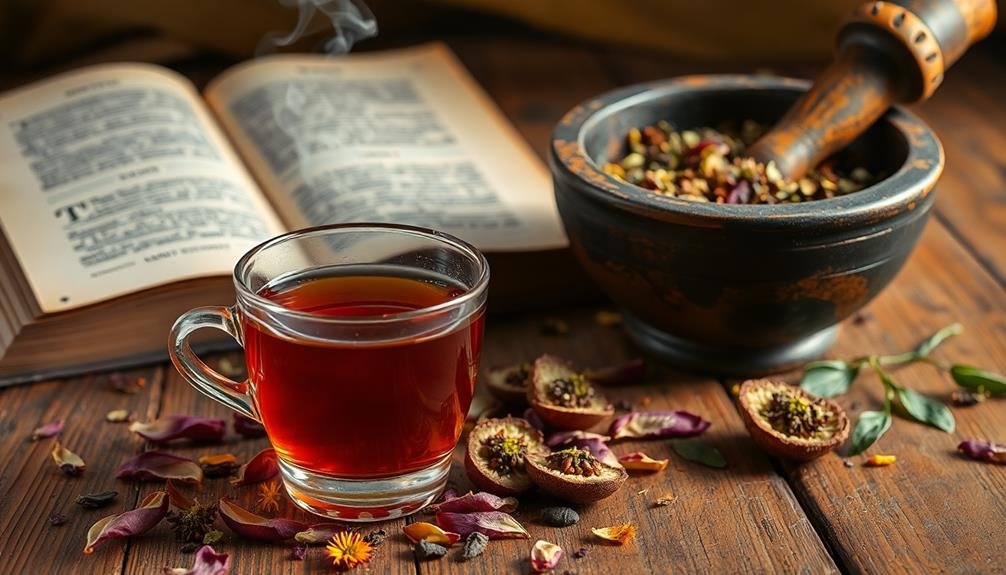
Passionflower joins valerian root as a key player in Ayurvedic sleep teas, offering its own unique benefits for those struggling with anxiety-related sleep issues. This climbing vine, native to the Americas, has been used for centuries in traditional medicine to calm nerves and promote relaxation.
You'll find passionflower particularly effective if racing thoughts keep you awake at night. It works by increasing levels of gamma-aminobutyric acid (GABA) in your brain, a neurotransmitter that reduces brain activity and helps you feel more tranquil. Studies have shown that passionflower can greatly improve sleep quality and reduce the time it takes to fall asleep.
When you brew passionflower in your Ayurvedic sleep tea, you're not just enjoying a pleasant, slightly earthy flavor. You're also benefiting from its mild sedative properties without the risk of dependency or side effects often associated with pharmaceutical sleep aids.
It's especially useful for those experiencing sleep disturbances due to menopause, as it can help alleviate hot flashes and night sweats.
Incorporate passionflower into your nightly routine, and you may find yourself drifting off to sleep more easily, with fewer anxious thoughts to disturb your rest.
Holy Basil: Balancing Adaptogenic Herb
Harmony finds its embodiment in holy basil, a revered herb in Ayurvedic medicine and a key ingredient in many sleep-promoting teas. Also known as Tulsi, this adaptogenic herb helps your body restore balance and cope with stress. It's been used for centuries to promote overall well-being and improve sleep quality.
Holy basil's sleep-enhancing properties stem from its ability to:
- Lower cortisol levels, reducing stress and anxiety
- Regulate blood sugar, preventing nighttime wakings
- Boost immunity, helping you stay healthy and sleep better
You'll find that holy basil's calming effects extend beyond bedtime. It can improve your mood, enhance mental clarity, and increase your resilience to daily stressors. By incorporating this powerful herb into your nightly tea routine, you're not just promoting better sleep but also nurturing your overall health.
When brewing your Ayurvedic sleep tea, steep holy basil leaves for 5-10 minutes in hot water. You can combine it with other sleep-promoting herbs like chamomile or lavender for an even more potent blend.
Nutmeg: Warming Sleep Enhancer
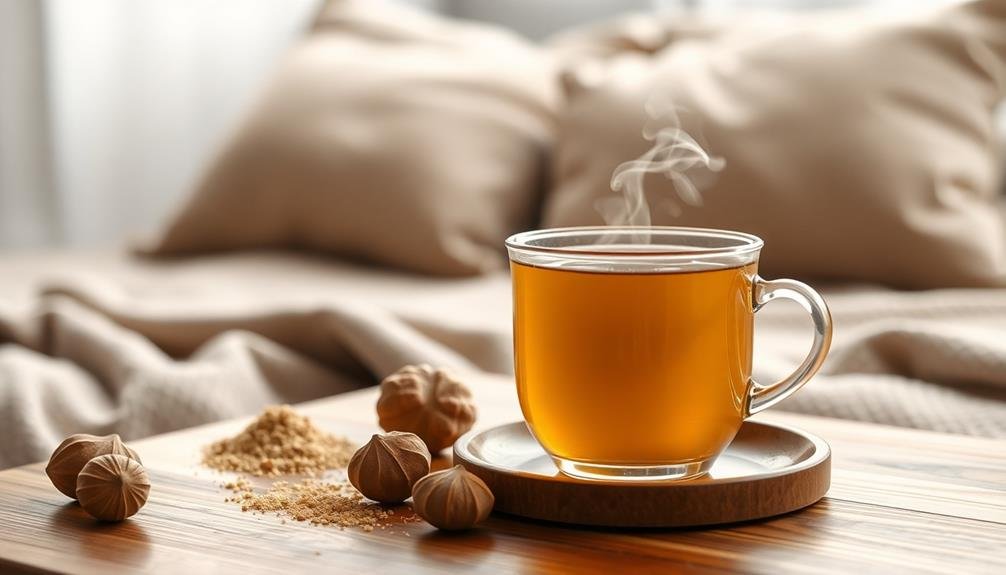
While many herbs in Ayurvedic sleep teas are known for their calming properties, nutmeg stands out as a warming and comforting ingredient. This aromatic spice has been used for centuries in Ayurvedic medicine to promote relaxation and improve sleep quality.
Nutmeg contains compounds that can help reduce anxiety and stress, making it easier for you to unwind at the end of the day. When you consume nutmeg in your sleep tea, you'll benefit from its mild sedative effects. It can help increase the production of serotonin, a neurotransmitter that regulates mood and sleep patterns.
Nutmeg also has pain-relieving properties, which may help alleviate any physical discomfort that's keeping you awake. You'll find that nutmeg adds a pleasant, slightly sweet flavor to your tea. It pairs well with other Ayurvedic herbs and can enhance the overall taste of your sleep blend.
However, it's important to use nutmeg in moderation, as excessive amounts can cause side effects. A small pinch in your tea is usually sufficient to reap its sleep-enhancing benefits. By incorporating nutmeg into your nightly tea ritual, you're tapping into an ancient Ayurvedic tradition that can help you achieve more restful and rejuvenating sleep.
Brewing Your Ayurvedic Sleep Tea
Now that you're familiar with the key ingredients in Ayurvedic sleep teas, it's time to learn how to brew the perfect cup. Start by selecting high-quality, organic ingredients to guarantee the best flavor and therapeutic benefits.
Use freshly boiled water, but allow it to cool for a minute before pouring it over your herbs. This prevents scorching and preserves the delicate flavors and medicinal properties.
For a standard cup of Ayurvedic sleep tea, use about 1 teaspoon of dried herbs per 8 ounces of water. Steep the tea for 5-10 minutes, depending on your desired strength. You can adjust the proportions to suit your taste preferences.
To enhance your tea-drinking experience and maximize its sleep-inducing effects, follow these steps:
- Brew your tea about an hour before bedtime
- Sip it slowly in a calm, relaxing environment
- Practice mindfulness or gentle breathing exercises while enjoying your tea
Incorporating Tea Into Bedtime Routine
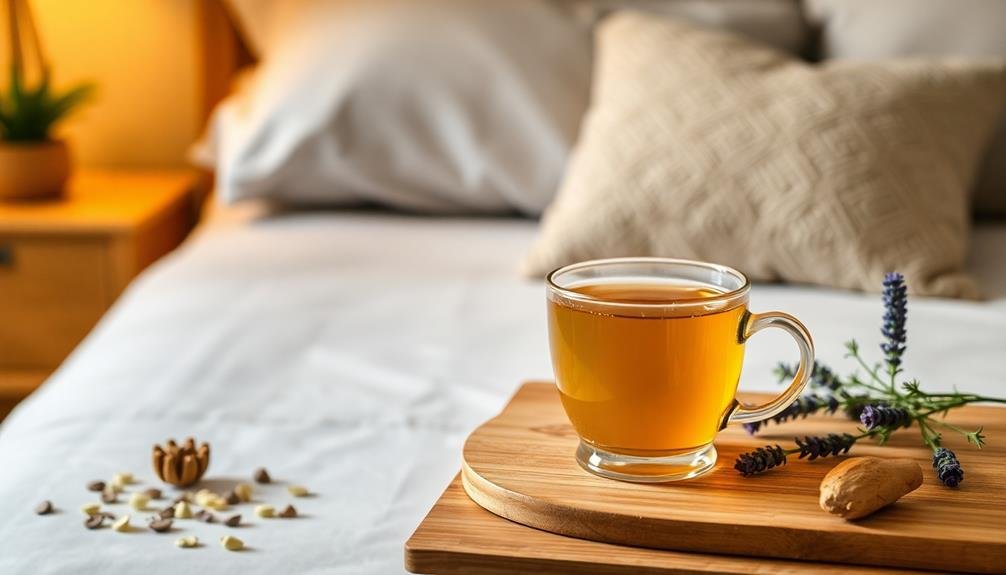
As the sun sets and evening approaches, it's time to contemplate how Ayurvedic sleep tea can become an integral part of your bedtime routine. Start by setting a consistent time to enjoy your tea, ideally 1-2 hours before bed. This allows your body to absorb the herbs' benefits and gives you time to wind down.
Create a peaceful environment for your tea ritual. Dim the lights, play soft music, or light a candle to signal to your body that it's time to relax. As you sip your tea, practice mindfulness by focusing on its aroma, warmth, and flavor. This can help quiet your mind and reduce stress.
Pair your tea with calming activities like reading, gentle stretching, or meditation. Avoid screens during this time, as blue light can interfere with your sleep cycle. Instead, use this period for reflection or journaling.
Make your tea routine a non-negotiable part of your evening. Consistency is key in training your body to associate the tea with sleep. Over time, you'll find that the mere act of preparing your Ayurvedic sleep tea triggers a relaxation response, helping you shift more easily into a restful night's sleep.
Frequently Asked Questions
Are There Any Side Effects of Drinking Ayurvedic Sleep Tea Regularly?
You might experience some side effects from regular Ayurvedic sleep tea consumption. These can include drowsiness, upset stomach, or interactions with medications. It's best to consult your doctor, especially if you're pregnant or have existing health conditions.
Can Pregnant Women Safely Consume Ayurvedic Sleep Tea?
You should consult your doctor before drinking any herbal tea during pregnancy. While some ingredients may be safe, others could pose risks. It's best to err on the side of caution and get professional medical advice.
How Long Does It Take for Ayurvedic Sleep Tea to Show Results?
You'll typically notice effects within 30-60 minutes of drinking ayurvedic sleep tea. However, for long-term benefits, it's best to consume it regularly for 2-4 weeks. Everyone's different, so your experience may vary.
Is Ayurvedic Sleep Tea Addictive or Habit-Forming?
You shouldn't worry about addiction with Ayurvedic sleep tea. It's not habit-forming like some sleep aids. However, you might grow accustomed to its calming ritual. If you're concerned, try alternating it with other relaxation techniques.
Can Ayurvedic Sleep Tea Interact With Prescription Sleep Medications?
You should be cautious when mixing herbal teas with prescription sleep meds. They can interact, potentially altering the medication's effectiveness or causing side effects. Always consult your doctor before combining any herbs with your prescribed medications.
In Summary
You've now discovered the essential ingredients for a powerful Ayurvedic sleep tea. By incorporating this blend into your nightly routine, you'll be harnessing centuries-old wisdom to improve your sleep quality. Remember, consistency is key. Give your body time to adjust to these natural remedies. Don't be afraid to experiment with ratios to find what works best for you. Sweet dreams await as you initiate this journey to better sleep through ancient Ayurvedic practices.

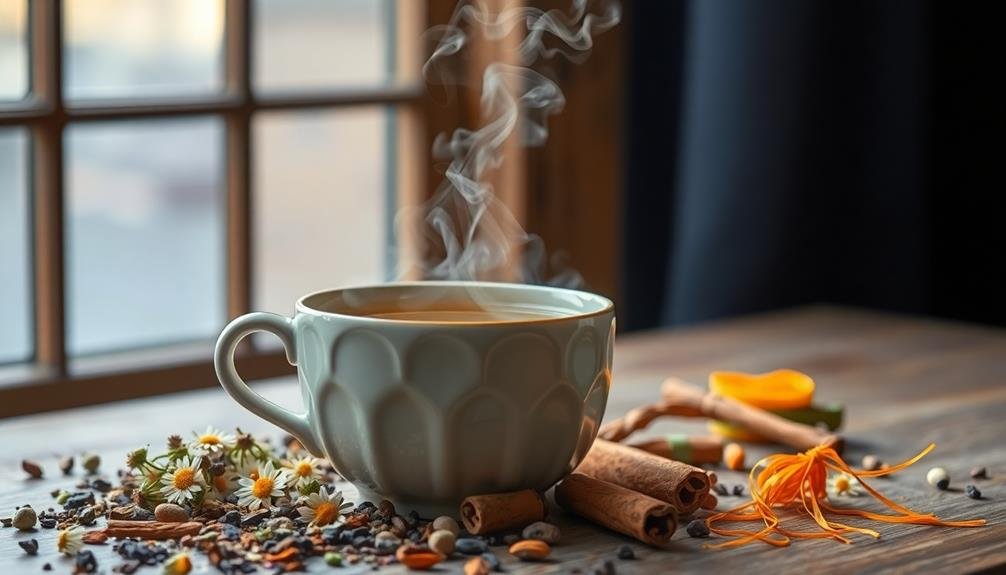



Leave a Reply